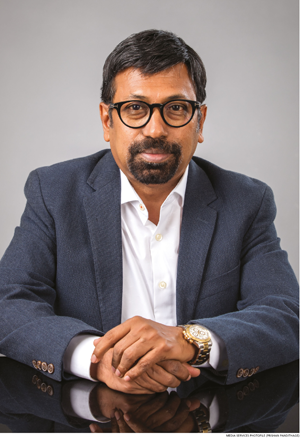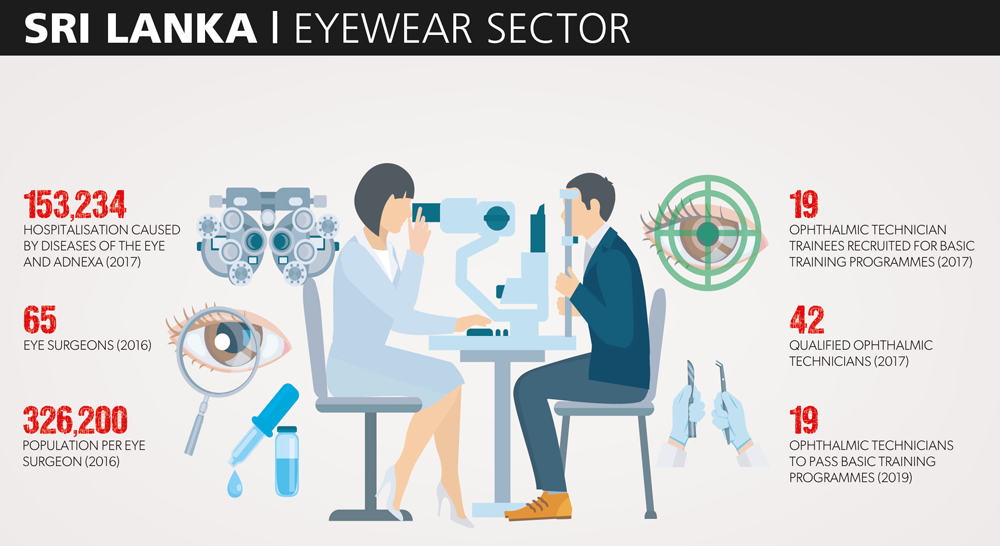EYEWEAR SECTOR
VISION FOR ALL
Compiled by Yamini Sequeira
ENVISIONING A NATIONAL VISION
Mihira Wickramarachchi sees extensive development of the eye care market
The government’s Vision 2020 programme provides free eye care and lenses, and is aimed at eliminating avoidable blindness in Sri Lanka by 2020. However, it is yet to release a report on whether this goal will be achieved by then. There’s no doubt that due to the availability of free ocular lenses, the number of patients seeking optical surgery in state hospitals has witnessed a drastic increase.

At present, over 285 million people globally suffer from vision related problems and more than 90 percent of them reside in low or middle income countries.
It is reported that over 9.3 million Sri Lankans suffer from some form of vision impairment. Of this, 8.2 million were over 40 years old in 2016. The Ministry of Health says one of the major causes of cataract is diabetes – and it cautions that schoolchildren who suffer from obesity are vulnerable to cataract or other vision impairments later in life.
Mihira Wickramarachchi observes: “The eye care sector has grown rapidly in recent years. Many luxury designer eyewear brands have been introduced to the local market. There is a discernible growing demand for branded eyewear. Sri Lankan consumers are savvy and exposed to brands on their travels abroad. Moreover, branded eyewear is valued at lower price points since watches and sunglasses are duty-free in Sri Lanka.”
EYEWEAR TRENDS According to Wickramarachchi, “eyewear has become a key accessory for people, and is part and parcel of their lifestyles. Fashion conscious folks wear different eyewear for varying purposes and occasions.

Today, people spend many hours in front of the computer so they need to wear protective lenses to cut out the harmful blue rays emanating from their screens. In fact, unlike the old filament bulbs, new compact fluorescent lamp (CFL) and LED bulbs are harmful for the eyes although they may be environmentally-friendly.”
He also notes that in Sri Lanka where sunrays beat down fiercely, UV resistant eyewear is essential for people of all ages: “People are sometimes hesitant to use sunglasses for fear that they will be made fun of but it is essential to do so to avoid harming the quality of one’s vision.”
“Regular retina checks should also be conducted to prevent future blindness. A good eye doctor of a reputable optician would carry out the required checks. Everyone above 35 should have their eyes checked regularly,” he recommends.
AURICULAR HEALTH Talking about people with other disabilities whom he has attended to, Wickramarachchi explains: “Apart from eyesight concerns, hearing must also be checked at the newborn stage so that those with hearing deficits in the form of birth defects can be treated without delay.”
“Cochlear implants go a long way in restoring hearing. In Sri Lanka, two percent of deafness exists due to birth defects or other diseases contracted by mothers and passed on to the foetus, and cochlear implants restore hearing for these newborns,” he notes.
Wickramarachchi elaborates: “Although the approximate cost of cochlear implants is as high as Rs. 3 million, the government subsidises part of this for the economically disadvantaged.”
“Most clinics check newborns for seeing or hearing disabilities. Newborns in lower income groups are more likely to have their disabilities overlooked while premature babies may also suffer vision or hearing loss at times. Educated parents are better aware and probably more responsible when it comes to checking,” he asserts.
Wickramarachchi points out that “any delay cannot be recovered as children pick up speech and language in the first three years. So it’s advisable to have cochlear implant procedures as early as when they’re eight or nine months old.”
He elaborates: “Cochlear technology is enabled to connect to smart devices with great clarity as implants cancel other peripheral sounds so that one can even hear better than a person with normal hearing. Studies have indicated that children with cochlear implants demonstrate better academic results because speech is magnified while peripheral sounds are reduced.”
Greater sensitisation of people towards persons with disabilities is an urgent need. Commendably in Sri Lanka however, a deaf person can apply for a driver’s licence.
Wickramarachchi cites a new threat that is on the rise due to headphone and earphone usage, which can damage hearing and bring about high frequency loss for people with perfectly normal hearing.
“Noise pollution is a real threat and we need to treat it as such. The Sri Lanka Police has brought in a law to ban loud musical horns usually found on passenger buses. Sound pollution leads to tinnitus and heart attacks, which are triggered by stress. Even at the airport, we have recommended the use of sound cancelling headphones for airport workers exposed to loud aircraft engines,” he states.
RETAIL DIMENSIONS Looping back to the emerging trend of branded eyewear in the market, Wickramarachchi remarks: “Brand conscious people prefer to own branded eyewear; but customers should evaluate the selected brands to see if they match their needs and ask questions about the materials used even if it is a branded product.”
The exercise of purchasing eyewear should be done at leisure and without rushing. “Retail sales in pharmaceuticals and drugs, under which umbrella our business is included, have tapered off by as much as 35 percent given the present economic slowdown where customers prefer not to spend on what they view as unnecessary or luxuries,” he reveals.
However, there has been a recent uptick in sales and Wickramarachchi is hopeful that this would continue for the rest of the year.
He supports turning Sri Lanka into a shopping hub and muses that “apart from satisfying the demand for global brands, Sri Lanka needs to build local brands in all lifestyle areas because when tourists visit, they’re amazed by the aesthetics of our local ware.”
In conclusion, Wickramarachchi asserts that “unless we build local brands, Sri Lanka won’t become a genuine shopping hub. And while foreign brands will attract, local brands should also gain.
To transform our country into a shopping hub, you need a wide variety of items such as designer jewellery, spices and so on to shop for. The fact that foreigners can reclaim VAT on their way out at the airport is an incentive to shop in Sri Lanka.”






